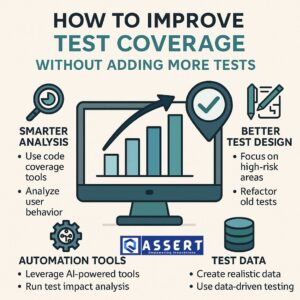In today’s fast-moving software world, test automation helps teams save time and deliver quality faster. But buying commercial tools can be expensive. That’s where open source libraries for test automation come in.
These libraries are free, easy to use, and supported by active developer communities. Let’s explore some of the best open source libraries every QA engineer should know.
1. Selenium
Selenium is one of the most popular open source libraries for web test automation. It supports multiple browsers like Chrome, Firefox, and Edge, and works with many languages such as Java, Python, and JavaScript.
You can write automated scripts for UI testing, perform cross-browser testing, and integrate Selenium easily with tools like TestNG or Cucumber.
🔗 Learn more: https://www.selenium.dev
2. Playwright
Playwright is a modern automation library by Microsoft. It supports web, mobile, and API testing using one framework.
You can write tests in Java, Python, TypeScript, or .NET, and it supports parallel execution and auto-waiting features. Playwright is great for teams looking for faster, more stable web tests.
🔗 Learn more: https://playwright.dev
3. Appium
If you’re testing mobile apps, Appium is a must-try library. It’s an open source tool for automating native, hybrid, and mobile web apps on Android and iOS.
Appium supports multiple programming languages and frameworks, making it easy to create reusable mobile test scripts.
🔗 Learn more: https://appium.io
4. RestAssured
For API automation, RestAssured is a powerful Java library. It helps you test RESTful APIs easily using simple and readable syntax.
You can verify responses, headers, and even authentication using a few lines of code. RestAssured integrates well with JUnit or TestNG for reporting.
🔗 Learn more: https://rest-assured.io
5. Cypress
Cypress is an open source front-end testing library for web applications. It runs directly in the browser, so it gives instant feedback and fast test execution.
It’s especially popular among JavaScript developers and supports visual test debugging.
🔗 Learn more: https://www.cypress.io
6. JUnit and TestNG
For unit and integration testing, JUnit (for Java) and TestNG are the most used open source libraries. They help organize test cases, run test suites, and generate reports.
You can also combine them with Selenium or RestAssured for complete automation setups.
🔗 Learn more:
7. Cucumber
Cucumber is a library used for Behavior Driven Development (BDD). It allows writing test cases in plain English (Gherkin) so even non-technical team members can understand them.
You can integrate Cucumber with Selenium, Playwright, or Appium for end-to-end testing.
🔗 Learn more: https://cucumber.io
8. Robot Framework
Robot Framework is a flexible open source automation library for web, mobile, and API testing. It supports keywords, which makes tests easier to read and maintain.
You can also extend it using Python libraries for more complex workflows.
🔗 Learn more: https://robotframework.org
Why Use Open Source Libraries?
-
💰 Free to use – No license cost.
-
⚙️ Customizable – You can modify code as per your project needs.
-
🌍 Community support – Large active communities help with updates and fixes.
-
🔄 Integration friendly – Works easily with CI/CD, reporting, and version control tools.
Conclusion
Using open source libraries for test automation helps QA teams test faster, reduce costs, and improve quality. Whether you are automating web, mobile, or API tests, these libraries provide everything you need to start strong.
Try a few of them and see which one fits your project best!




